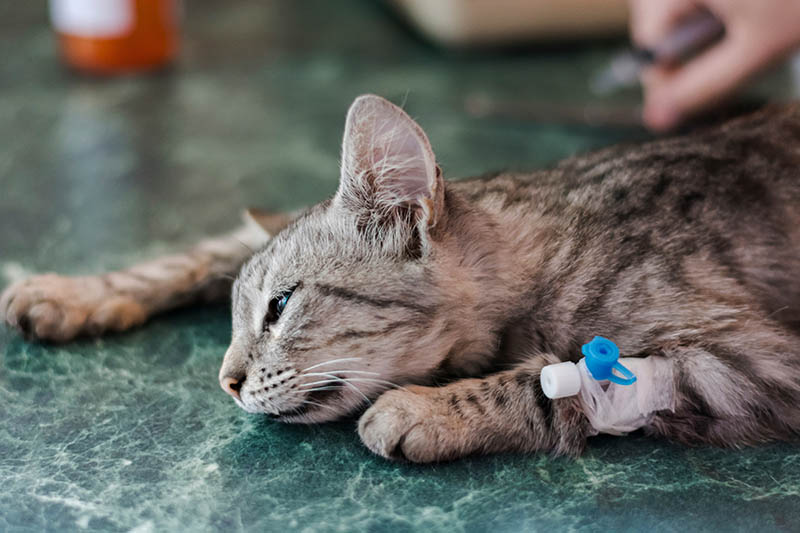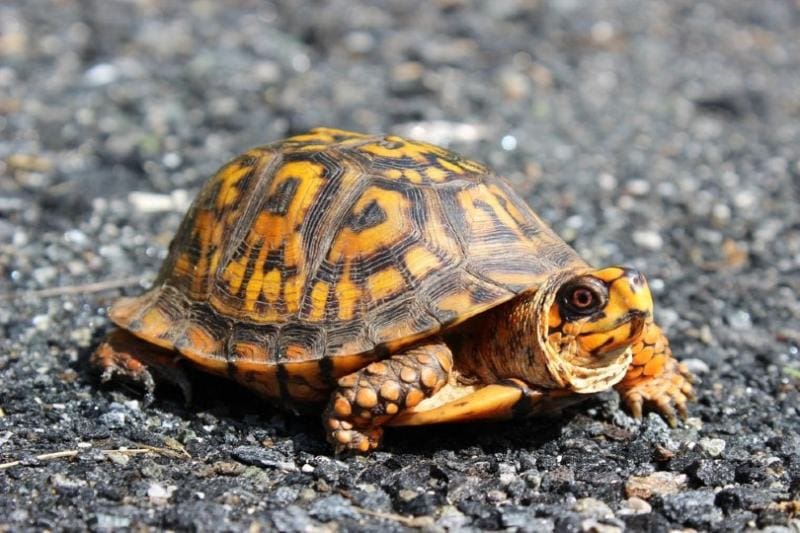Can Cats Eat Carrots? Vet-Reviewed Benefits, Portions & Alternatives

Updated on

Carrots are colorful and crunchy, and it feels like it would be awfully adorable to watch our cats crunching on one. Are carrots safe for cats? Carrots aren’t toxic for cats and are therefore considered safe; however, they offer very little nutritional benefit to your feline.
Carrots are long taproots from the Apiaceae family. Many different people and cultures enjoy having these as staples in their diet, and their greens are even tasty in a salad. As a crunchy, delicious veggie that we consume regularly, it’s enticing when we consider giving our cats a little taste. Obviously, carrots are healthy for humans, but what are their benefits, if any, for cats? Should we really be encouraging felines to eat these roots?
Are Carrots Safe for Cats to Consume?
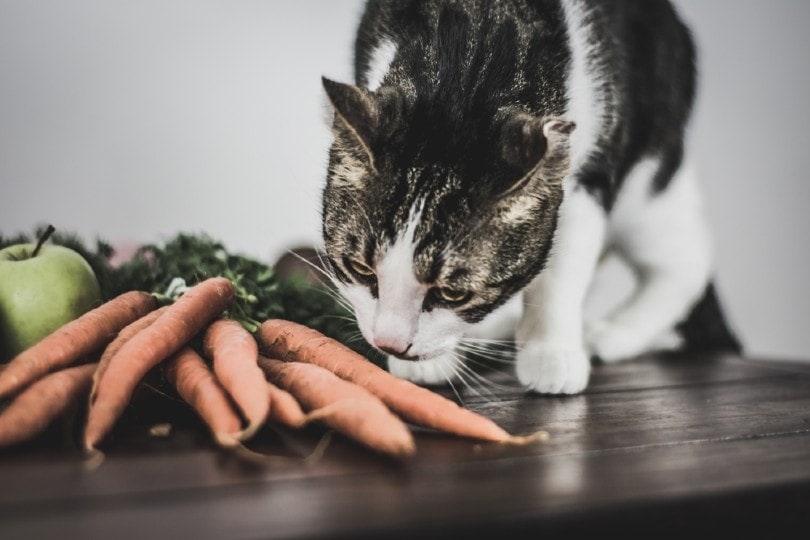
There are certainly some foods that our pets should never pick off our plates, but plain, boiled carrots are some of the few vegetables that cats can eat without you having to worry about them afterward. You don’t ever want to give your cats a carrot that has been cooked with other spices. For example, garlic and onion are two ingredients that you should never feed your fur kid.
Do Carrots Give Cats Health Benefits?
Though carrots are high in fiber and in some vitamins, our feline friends don’t process vegetables the same way we do, and any nutrition they receive from a carrot would be too minimal to call it a very healthy snack. They are, after all, natural carnivores, and eating too many plants could create some long-term health issues. In addition, it’s important to note the high fiber content in carrots could result in a cat with an upset tummy. They are also high in sugar and should only be given as a treat sparingly. Diabetic cats should never be given carrots.
Raw vs. Cooked Carrots
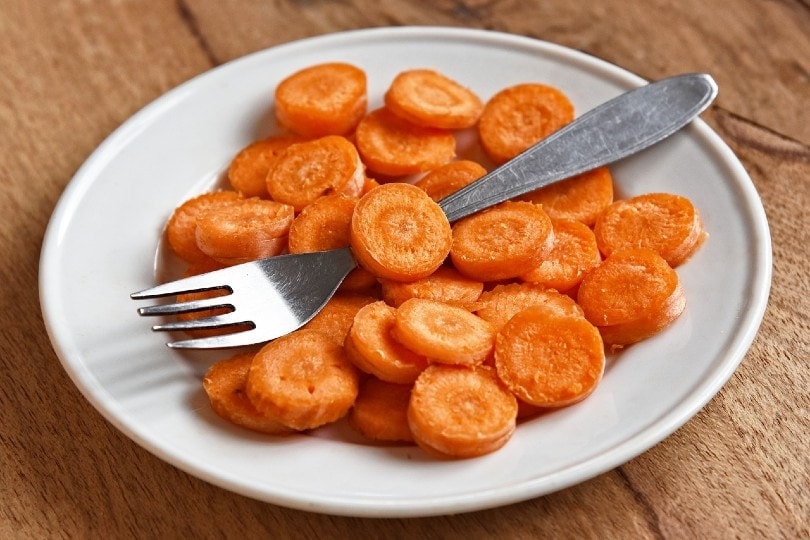
Between raw and cooked carrots, is one better for your cat than the other? Cooked carrots are your safest option if you decide to get them a little carrot treat. Make sure that they are plain and free from any seasoning, including salt and pepper, before offering them to your cat. Cooked carrots are a lot softer than raw and go down a lot smoother.
Raw carrots won’t hurt your pet, but they are hard and rigid and could be a choking hazard for your pet. Whether using cooked or raw carrots, cut them up into very small pieces before feeding them to your animals. Additionally, always observe your cats when they’re eating any human food.
Do Cats Enjoy Eating Carrots?
Even though carrots are a safe food for them, cats won’t always jump at the chance to eat them. Some cats are pickier than others, just like humans, and it’s possible that they refuse to eat them.
Believe it or not, cats don’t have tastebuds that detect sweetness, and carrots taste very different for them than they do for you. Therefore, if your cat refuses to try carrots, you should not worry or obsess over trying to get your cat to accept them.
Portioning Carrots for Your Cat
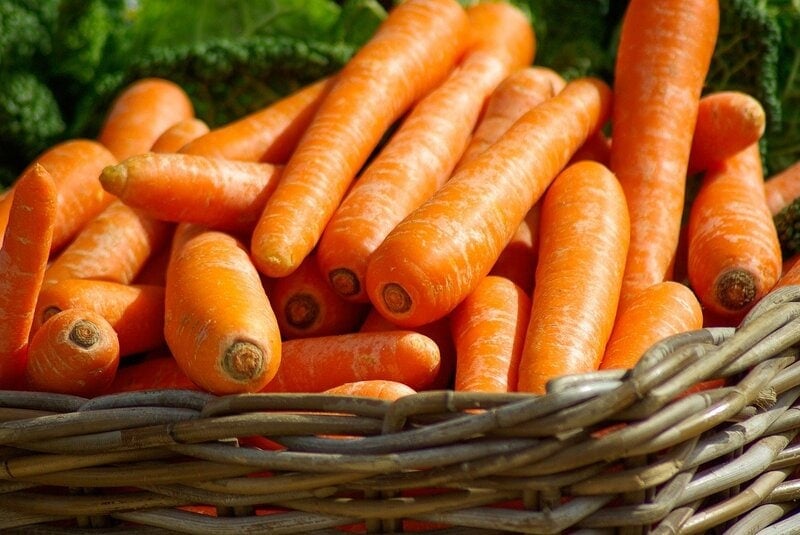
If your cat enjoys carrots and you decide to feed them to your cat, you should only do so rarely and offer them just a tiny amount. As mentioned before, a carnivore such as your cat doesn’t necessarily need vegetables in their diet, and feeding too much at once might result in bloat, diarrhea, and other digestive issues for your kitty.
Other Treats Your Cat Can Enjoy
If you’ve tried feeding your cats carrots and they aren’t taking the bait, don’t be afraid to try out some other cat-safe treats. Most cats readily accept treats that are animal-meat based, such as chicken, beef, lamb, or pork treats. These come in a variety of options, although it is best to stick with the most natural forms of treats (for example: freeze-dried treats comprised of a single ingredient are better than heavily processed treats).
You can even make treats for your cat at home! Here is one homemade cat treat recipe we love:
Salmon Cat Treats
- 10 ounces canned salmon
- 1 large egg
- 2 cups whole wheat flour
Preheat your kitchen oven to 350°F (~180°C). Pour the canned salmon (without draining it) into a food processor and chop it as finely as possible. In a stand mixer, beat the chopped salmon, egg, and flour together until it forms a dough. If the salmon dough is too dry, stir in 1/3 cup of water. If the dough gets too wet, slowly add a little bit more flour. Roll your prepared dough onto a floured surface until it is ¼-inch thick. Use a cookie cutter shape of your choice to cut out your treats. Set the cat treats on a baking sheet lined with parchment paper and bake them for 20 minutes until they’re brown and crunchy. Let them cool all the way to room temperature before serving them to your cats.
Conclusion
While carrots are safe for your cat to eat, they aren’t nutritionally appropriate for them. Being a carnivore, your cat will be better off with animal-meat based treats that you can either purchase or make at home yourself. If your cat seems to enjoy the taste of carrots, you may offer a small morsel of cooked, unseasoned carrots to them occasionally.
We have more articles about what cats can eat, including:
Featured Image Credit: Armando Arauz, Unsplash



